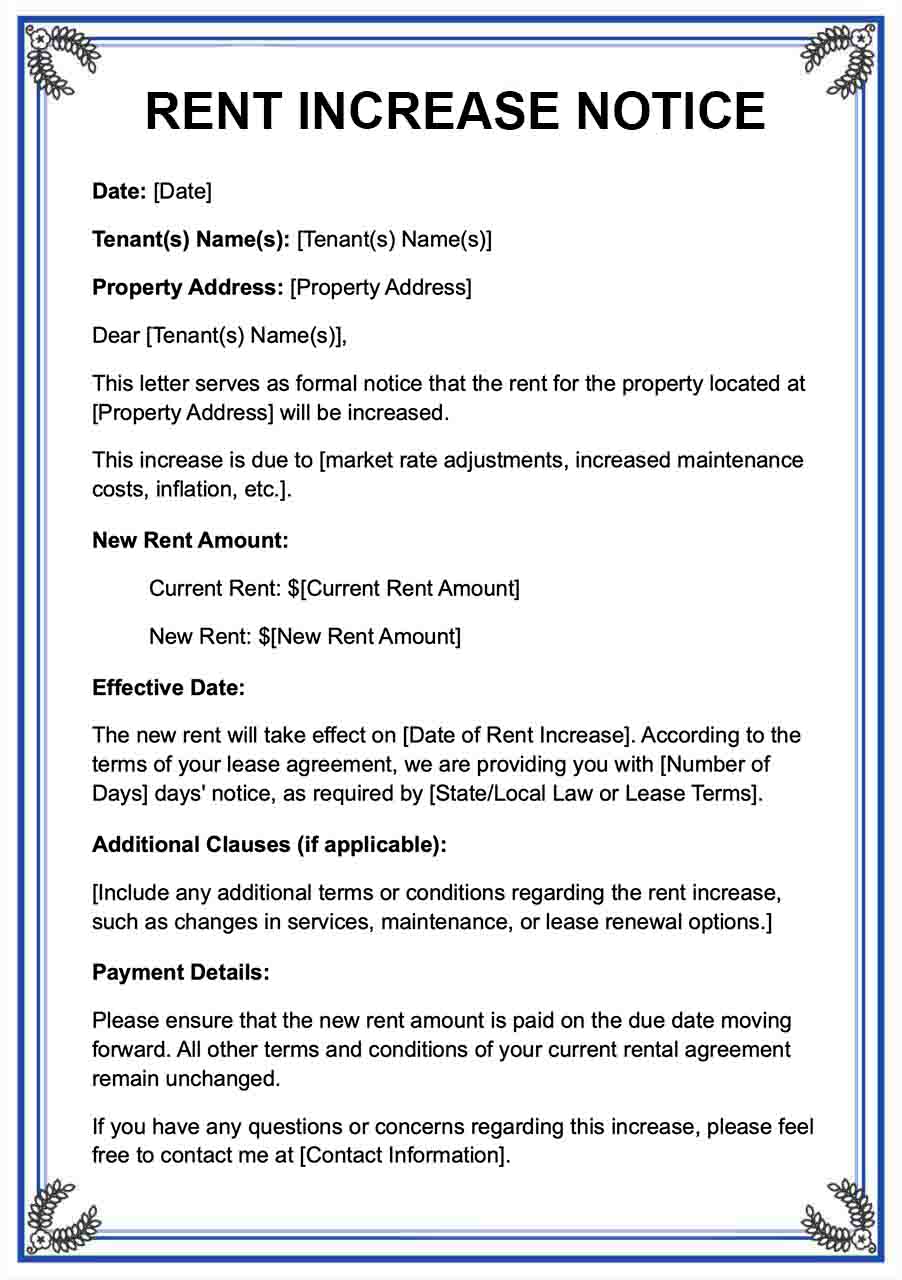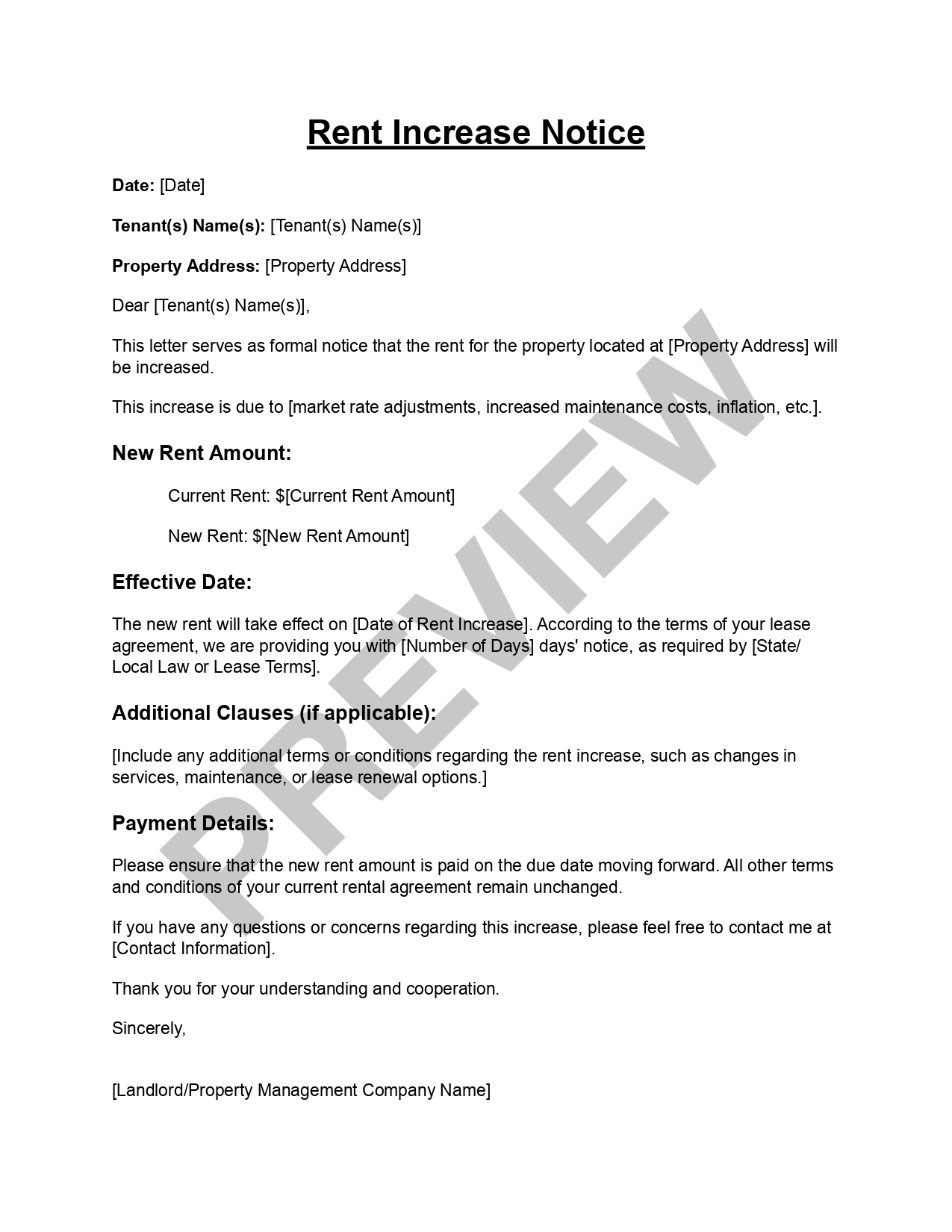Generate Rent Increase Notice
A Rent Increase Notice is a formal letter informing a tenant of a change in their rent amount. It includes the new rent, effective date, and complies with the required notice period per lease or local laws. The notice ensures clear communication between landlord and tenant.
Last Updated September 2024
Alternative names:
Rental Adjustment Notice Rent Increase Letter Rent Raise Notification Notice of Rent AdjustmentWhat is a Rent Increase Notice?
A Rent Increase Notice is a formal notification from a landlord or property manager to a tenant, informing them of an upcoming change in the rental rate for the property they are leasing. This notice provides details such as the new rent amount, the date the increase takes effect, and ensures that the tenant receives proper notice in accordance with local laws or lease terms. It serves to maintain transparency and gives tenants time to adjust to the new rate or make other arrangements.
How should I calculate my rent increase?
Calculating a rent increase involves several steps to ensure it's fair and aligns with legal and market standards. Our general approach:
-
Review Lease Agreement: Check your lease for any clauses related to rent increases, including limits or conditions.
-
Understand Local Laws: Research local regulations on rent increases, including maximum allowable increases and required notice periods.
-
Consider Market Rates: Compare your rent with similar properties in the area to ensure your increase is competitive and justified.
-
Calculate Based on Costs: If the increase is due to rising maintenance or operating costs, calculate the additional amount needed to cover these expense.
-
Consider CPI and Inflation: Use the Consumer Price Index (CPI) to gauge inflation and adjust rent proportionally. For example, if CPI has increased by 3%, you might raise rent by a similar percentage to reflect rising costs.
-
Review and Adjust: Ensure the proposed increase complies with any rent control laws and is reasonable relative to the property’s value and condition.
This approach helps ensure the increase is fair, legal, and justifiable.
What should be included in a Rent Increase Notice?
A Rent Increase Notice should include the following key elements:
-
Date of Notice: The date the notice is issued.
-
Tenant’s Information: Full name(s) of the tenant(s).
-
Property Address: The rental property's full addres.
-
Current Rent Amount: The tenant's existing rent.
-
New Rent Amount: The adjusted rent amount.
-
Effective Date: The date the new rent will begin.
-
Notice Period: Mention of the required notice period (e.g., 30 or 60 days), as per the lease or local laws.
-
Reason for Increase: A brief explanation for the rent increase (e.g., market adjustments, increased costs).
-
Payment Instructions: Any changes in payment methods or details.
-
Landlord’s Contact Information: How the tenant can reach the landlord for questions or concerns.
-
Additional Clauses (if applicable): Any new terms or changes in the lease.
-
Landlord’s Signature: A formal signature from the landlord or property manager.
These components ensure the tenant has all the necessary information and complies with legal requirements.
Why is a Rent Increase Notice important?
A Rent Increase Notice is important for several reasons:
-
Legal Compliance: It ensures the landlord follows local laws and lease agreements by providing the required notice period before adjusting the rent.
-
Transparency: The notice maintains clear communication between the landlord and tenant, preventing misunderstandings regarding the new rent amount and the effective date.
-
Tenant Preparation: It gives the tenant time to adjust their budget or consider their housing options, including whether to stay or move out.
-
Documentation: The written notice provides a formal record of the rent change, protecting both parties in case of future disputes.
Overall, a Rent Increase Notice helps maintain a fair and transparent landlord-tenant relationship.
Frequently Asked Questions
The required notice period depends on local laws and the lease agreement. Typically, it's 30 to 60 days, but this can vary by location.
No, a landlord can only increase rent at the end of the lease term or during a month-to-month tenancy, unless otherwise specified in the lease agreement. Local rent control laws may also limit when and how much rent can be increased.
No, tenants don’t typically need to approve a rent increase. However, if the tenant is on a fixed-term lease, the increase can only occur when the lease is renewed, unless otherwise stated in the lease.
Yes, tenants can try to negotiate a rent increase by discussing it with the landlord, especially if the increase feels too high or if there are concerns about property conditions.
If a tenant refuses to pay the increased rent and remains in the property, the landlord may take legal action, which could include eviction for non-payment, depending on the lease and local laws.


